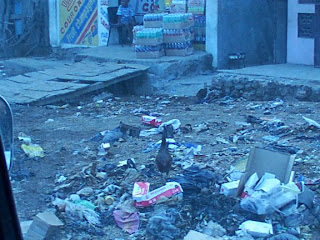 The UN office at Cap Haitian International Airport.
The UN office at Cap Haitian International Airport.The United Nations has had a peacekeeping force of some 3,000 international forces in Haiti for a few years now. As most local police are corrupt, underfunded, and under equipped these are the only stabilizing force against the gangs and drug cartels that pray on the Haitian citizens. While we were in Haiti, the gang violence in Port Au Prince reached a crescendo with attacks on UN vehicles and soldiers. Some of these were perpetrated by children under the age of 14, weilding AK-47's supplied by the now defunct Aristied government. Usually the UN will not engage the population in a firefight, but the day before we left we were told by our missionary hosts of street to street gunfights, as the UN took a stand to rout the gangs from the city streets.
 12 ft. walls surrounding the OMS compound.
12 ft. walls surrounding the OMS compound.Walls are a common sight in Haitian life. They define those who have and those who have not, they protect and preserve, and they segregate and divide. The original land area or the OMS compound was almost twice what is circled by walls today. Squatters are a fact of life here, and the only way to drive off the desperate and destitute is by the gun. Saints would do no such thing, so walls were erected around the land not yet taken over by the poor to keep the establishment of service to the Haitian people intact. The envious and unrepentant look upon them with resentment, and the VooDoo practitioners focus their malice upon them and those they protect. The broken in spirit see hope in the establishment of secure boundaries, where help for what ails the body and soul can be found.
 Multipurpose waterway.
Multipurpose waterway.Fresh water in Haiti is rarity. Here a shallow river provides water for a multiple of uses. Cars are washed, garbage and sewerage is disposed of, bodies are washed and the poor drink from the same source, fish and wildlife are polluted out of existence by this. Deforestation and erosion scar the land causing rockfalls and mudslides that take lives without warning. This desolation has been caused by a people fighting to survive day to day in a land almost devoid of hope and natural resorces. I fish many of the waters in Massachusetts where I live and appreciate their beauty. Many times I feel shame and anger at the sight of trash left by uncaring people who have no appreciation for the gift of the natural world God has given us. Perhaps if these unthinking minds and unconcerned hearts had only such places like these in Haiti in which to get their drinking water or to bathe they would consider the bounty The Father has heaped on us, and treat it accordingly.
 Housing of the middle class.
Housing of the middle class.Haiti is a nation of over 8 million as of 2005 estimates. The area of Haiti is only slightly less than that of Maryland, and much of the country is arid and mountainous. 75% of the population crowds into it's two major cities, Cap Haitian and Port Au Prince. 80% of the people live below poverty level, for us in the United States thats a little over $10,000 annual salary. For the Haitian citizen it is less than $500 a year. The most basic of needs take precedence, food and shelter. Above is a coastal district of Cap Haitian that is blessed with concrete domiciles, offering protection from hurricanes, and offering some sense of security.
 Dangerous shores.
Dangerous shores.This is a beach front property in Cap Haitian. The erratic fluctuation of an unstable economy and political upheaval see flurries of unfinished construction as resources fail, and long intervals of decay and stagnation. This has taught the people of Haiti to be resourceful with what they do have available to them. Cars that breakdown and can not be fixed due to lack of parts or money are stripped to the bare metal frame, every nut, bolt, scrap of upholstery and length of wire is salvaged, reused, sold, or traded.
 Pop shop.
Pop shop.Soda pop is as common in Haiti as in the US. Small businesses like this are found all throughout Cap Haitian and Port Au Prince. The glass bottle is more valuable than it's contents and are always reused. Of all the refuse one will see in Haiti, a discarded pop bottle is the most rare.
The next post in this series will show the natural beauty that the nation of Haiti still possesses. while there is precious little of it left, it is breathtakingly beautiful none the less. It shows I think that God has not completely forsaken this place, and as the Faithful labor to do the work of The Kingdom in the hearts of the Haitian people the land may yet heal.




No comments:
Post a Comment